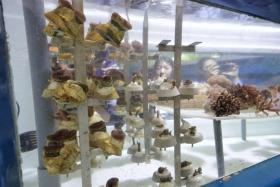Do people in Singapore know how to recycle?
Two mothers were tasked with collecting their family's trash for a week and put to the test
Trash talk tends to be a no-no in the newsroom, but an exception was made last week when two readers came in carting bags of household rubbish.
Housewife Sharon Loh and business psychologist Skye Yeo had volunteered to take part in an exercise to test just how well versed people here are in recycling.
There is clearly a knowledge gap. Singapore generated around 900,000 tonnes of plastic waste last year, but only 4 per cent was recycled - the lowest rate in 15 years.
The test involved the women, both mothers of two, collecting their family's trash for a week and bringing it to the newsroom.
They were then asked to sort their trash into recyclables and non-recyclables - all under the watchful eye of Ms Tng Mei Ling from the National Environment Agency's (NEA's) waste and resource management department.
Madam Yeo, 45, prides herself on being very eco-friendly. She had just a small collection of glass bottles, cans, bottle caps and paper. Apart from separating her trash at home, she engages in other green practices such as repurposing fruit peels and composting.
In contrast, Mrs Loh, 34, who started recycling only two years ago and admits she is quite new to the process, had a larger pile of rubbish.
Nevertheless, Ms Tng praised her for her efforts in correctly sorting most of her trash, and especially for making the effort to wash and clean plastic bottles before separating them for recycling.
However, she noted that Mrs Loh's pile of "recyclables" included old socks and toys, which are not suitable for recycling. Toys are often made of different types of materials, sometimes even including electronic parts. Ms Tng advised Mrs Loh to donate the toys if they were in good condition or otherwise bin them.
The advice took Mrs Loh by surprise. "I didn't know toys couldn't be recycled - to me, it all looks like plastic," she said.
She later reflected on how she had come a long way from her initial practice of just throwing everything away.
"It's a lot more convenient to just dump everything in the bin... But now I know what I can and can't recycle."
Ms Tng had three tips for people who want to start recycling.
Start simply by recycling common household items made of glass, paper, metal and plastic, including beverage cartons and drink bottles.
All recyclables should be free of liquid and food waste to avoid contaminating recycling bins and the recyclables within.
And those who want to know more about what can and cannot be recycled can check NEA's new recycling labels, which are listed on its website.
Ms Tng noted that the amount of waste generated here each year could fill 15,000 Olympic-size swimming pools.
"This is not sustainable. By reducing waste, we can reduce the amount going to the incineration plant (and) extend the lifespan of our Semakau landfill," she said.
FOR MORE, READ THE STRAITS TIMES
Get The New Paper on your phone with the free TNP app. Download from the Apple App Store or Google Play Store now


